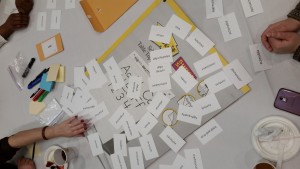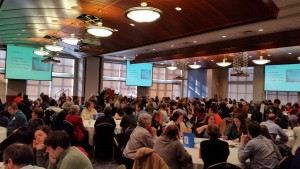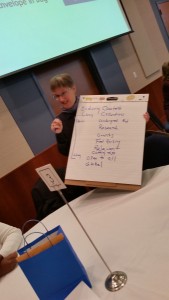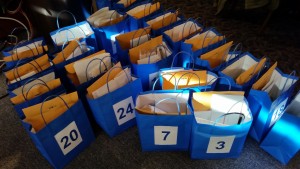More than 200 Library employees gathered on Friday, January 9, in the Ballroom of the Alice Campbell Alumni Center for the Library Retreat, which served as the kick-off event for the Library’s strategic planning initiative.
The Powerpoint Slides that were used in the retreat are provided here: RetreatSlidesFinal.
Dean Wilkin’s Opening Remarks
The Library Retreat opened with energizing remarks by the Dean and University Librarian John Wilkin. Dean Wilkin observed that strategic planning has different functions for organizations at different points in development. For a “lost” organization, strategic planning is an opportunity to find a purpose. But, for an organization with a strong sense of mission – like the University Library – strategic planning represents a more unique opportunity to sharpen and focus our vision and carefully choose a future path that builds on past success while breaking new ground. Dean Wilkin argued that libraries are masters of evolution and adapting to changing circumstances and that, while circumstances change, the Library’s purpose does not. Some changes are positive (e.g., the affordances of the Internet and the opportunity to work at scale) and others are more challenging (e.g., shrinking financial resources). We must be aware of the changes, keep a focus on the things that matter, and adapt to ensure that we can get those things done that matter. After a review of the Library’s Mission Statement, Dean Wilkin asked everyone to reflect on what makes our Library great and then concluded with this charge: “Let me be clear: our strategic plan must be broad and ambitious. It is also true, however, that we are leaders in some areas of work and must use that leadership to mobilize the library community to work collectively so that we can drive down costs and increase impact.”
Organizational Characteristics
Retreat participants were seated in 24 small groups. The first activity was an exploration of the organizational characteristics of the Library. Each group had a set of  72 cards with descriptive words, which they sorted into three piles – The Library Is, The Library Should Be, and The Library Should Not Be. Each group also had 8 blank cards so they could add words to any of the piles if they desired to do so. An analysis of the groups’ responses will be disseminated later in January.
72 cards with descriptive words, which they sorted into three piles – The Library Is, The Library Should Be, and The Library Should Not Be. Each group also had 8 blank cards so they could add words to any of the piles if they desired to do so. An analysis of the groups’ responses will be disseminated later in January.
Scenario Discussions
The next activities were small group discussions based on discussion prompts. Lisa Hinchliffe, Coordinator for Strategic Planning, explained that the use of scenarios for discussion was meant to generate ideas to think with over the coming months and not to indicate any predetermined decisions or priorities. Strategic planning is currently in a divergent, or idea generation, stage. The work of choosing and prioritizing will come later in the spring.
Each of the f ollowing six scenarios was discussed by four tables:
ollowing six scenarios was discussed by four tables:
- John Seely Brown, the author of The Social Life of Information, said that “The challenges we face are both fundamental and substantial. We have moved from an era of equilibrium to a new normal – an era of constant disequilibrium. Our ways of working, ways of creating value, and ways of innovating must be reframed.” How does the library currently approach innovation? What does it mean to reframe those innovation approaches? How should the library approach current or new staffing and organizational models that facilitate nimbleness? Of the ideas the group has generated, which three do you believe would be the most productive to pursue?
- In Boswell: A Life, Samuel Johnson wrote: “When a man writes from his own mind, he writes very rapidly. The greatest part of a writer’s time is spent in reading, in order to write; a man will turn over half a library to make one book.” The monograph continues to be a valued form for scholarship in many disciplines, particularly the humanities. What services and resources are most aligned with the work of faculty and graduate students who write monographs? What additional resources and services could the Library develop that would be valuable to them? What partnerships – on campus and off campus – would enable the Library to make such developments? Of the ideas the group has generated, which three do you believe would be the most productive to pursue?
- Jeff Bezos, founder of Amazon, once said that it is important to identify what is constant and does not change. What, if any, are the enduring constants for the University and the University Library? How should these things inform our planning and programmatic development work? Which ones should we pay attention to for future planning? Which ones should we stop clinging to and why? Of the ideas the group has generated, which three do you believe would be the most productive to pursue?
- As the CIC Library Directors continue to explore shared programmatic initiatives, the Library has an opportunity to re-think our local efforts. In light of the shared print repository program, the fact that different CIC schools have strengths in collecting, and the Library’s involvement in the HathiTrust/Google Books Project, what should be the Library’s priorities for its on-site tangible collections? How should user services be adapted or changed given this increased reliance on shared digital and print collections? Of the ideas the group has generated, which three do you believe would be the most productive to pursue?
- As faculty and researchers embrace new research practices, new research methods, and new approaches to disseminating their scholarship, what roles should the Library adopt to support the full life cycle of scholarly knowledge production, dissemination, and preservation? Are there partnerships – on campus and off campus – that the Library should create and/or nurture in order to engage in these roles? Of the ideas the group has generated, which three do you believe would be the most productive to pursue?
- In his October 27 address to the Library, the Provost identified “re-envision the student experience” as one of the University’s key initiatives. How did the Library contribute to the traditional student experience and what about those should be re-envisioned? What are the Library’s current contributions to this campus initiative and how well are these known on campus? What additional contributions could the Library make and what partnerships would enable doing so? Of the ideas the group has generated, which three do you believe would be the most productive to pursue?
After a break, Retreat participants switched to new tables and a second round of scenarios were discussed:
- The Library has a strong and unique partnership with the Graduate School of Library and Information Science (GSLIS). GSLIS students work as graduate assistants in our libraries, and library faculty and staff contribute to the teaching mission at GSLIS. GSLIS and the Library have a number of shared research projects and grants as well. What are the characteristics of our relationship that make it strong? How is it evolving? What ideas do you have for growing our work together? Are there other campus units where we should pursue a similar relationship? Of the ideas the group has generated, which three do you believe would be the most productive to pursue?
- Many online information environments provide a personalized experience based on user analytics. For example, Google “learns” about an individual’s interests, search patterns, etc., and then uses that for relevancy ranked search results. Amazon does something similar and “pushs” recommendations to its users. It is now possible for such analytics and data mining to be applied to Library databases and other discovery tools. What would be the advantages for our users if we invested resources to create personalized information environments? Or, should the Library focus its resources on delivery of full-text and encourage users to search in Google, Amazon, etc. for discovery? Or, is there another approach? Of the ideas the group has generated, which three do you believe would be the most productive to pursue?
- The Library manages one of the largest physical footprints of space on campus – hundreds of thousands of square feet. For this discussion, focus on the space that is for users. What is the purpose of having space for users? What are the different types of user spaces? Who benefits from this space and who does not? What could the Library do to better align the design of the space with our intentions for its use and user needs and experiences? Of the ideas the group has generated, which three do you believe would be the most productive to pursue?
- In his October 27 address to the Library, the Provost identified “intensify our international presence” as one of the University’s key initiatives. What are the components of the University’s international presence – in teaching, research, service, etc.? What are the Library’s current contributions to this initiative and how well are these known on campus? What additional contributions could the Library make and what partnerships would enable doing so? Of the ideas the group has generated, which three do you believe would be the most productive to pursue?
- Interdisciplinary is a way of life on most university campuses in the 21st “Launch large scale interdisciplinary research efforts aligned with the visioning future excellence themes” was an initiative highlighted in the Provost’s October 27th address to the Library. What are the Library’s current contributions to interdisciplinary research efforts? How does the Library track emerging interdisciplinary areas on campus? What additional contributions could the Library make to interdisciplinary research and what partnerships would enable doing so? Of the ideas the group has generated, which three do you believe would be the most productive to pursue?
- In his October 27 address to the Library, the Provost identified “increase and embrace diversity” as one of the University’s key initiatives. What are the components of the University’s diversity initiative – in the workplace, in teaching, as a focus of research, etc.? What are the Library’s current contributions to this campus initiative and how well are these known on campus? What additional contributions could the Library make and what partnerships would enable doing so? Of the ideas the group has generated, which three do you believe would be the most productive to pursue?
A summary of the responses for each scenario will be disseminated later in January.
Gathering Topic Ideas for Spring
As a final activity, each Retreat participant had the opportunity to identify “Up to Three Strategic Planning Topics I would Like to Propose for an Open Session Discussion During Spring 2015.” These ideas are being compiled into a single listing for analysis of themes and interest. A summary will be disseminated later in January.
Next Steps
The Retreat concluded with Lisa Hinchliffe, Coordinator for Strategic Planning, discussing next steps in the strategic planning initiative. They include compiling and disseminating retreat results, conducting a retreat evaluation and reviewing feedback,  scheduling focused discussion sessions, engaging campus stakeholders, and developing criteria for selecting and prioritizing ideas later in spring.
scheduling focused discussion sessions, engaging campus stakeholders, and developing criteria for selecting and prioritizing ideas later in spring.
Dean Wilkin had the final word and extended his thanks to everyone for their participation and engagement.




